Moving Microbial Science Forward
Moving Microbial Science Forward
Feature Article: The Undiscovered Planet Today, operating out of borrowed space in Harvard’s Center for the Environment, the Microbial...
Return to main article:
Today, operating out of borrowed space in Harvard’s Center for the Environment, the Microbial Sciences Initiative (www.msi.harvard.edu) funds six postdoctoral fellows who typically bridge two labs in different departments, often across schools; sponsors 12 undergraduate summer fellowships; arranges monthly seminars that bring in speakers from around the world; and hosts an annual symposium. This past summer, MSI held a workshop for high-school teachers designed to help them incorporate microbial education into their curricula. In the current academic year, the initiative will introduce two new undergraduate courses: Life Sciences 190hf, “Diverse Microbial Strategies for Metabolism, Pathogenesis and Chemical Signaling,” taught by Harvard Medical School (HMS) professor of genetics Gary Ruvkun, and Life Sciences 110, “A Microbial World,” designed for students pursuing microbial science as a secondary field and co-taught by professor of microbiology and molecular genetics Roberto Kolter and professor of biological chemistry and molecular pharmacology Jon Clardy, both of HMS, and Cabot associate professor of earth and planetary sciences Ann Pearson, a biogeochemist in the Faculty of Arts and Sciences.
Explore More From Current Issue

How a Harvard Hockey Legend Became a Needlepoint Artist
Joe Bertagna’s retirement project recreates figures from Boston sports history.

At Harvard’s Beck-Warren House, Ghosts Speak Many Languages
The quirky 1833 home now hosts Celtic scholars.

Bees and Flowers Are Falling Out of Sync
Scientists are revisiting an old way of thinking about extinction.



